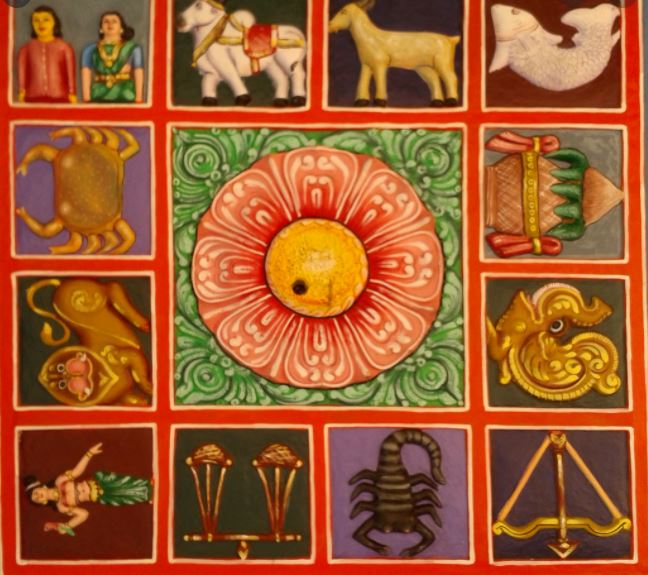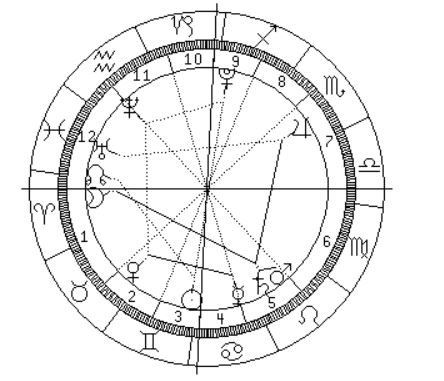Vedic astrology is one of the oldest forms of astrology in the world, with roots that date back over 3,000 years in India. It is based on the principles of the Vedas, the ancient Hindu scriptures, and has been passed down from generation to generation. The purpose of Vedic astrology is to help individuals understand their life better and make informed decisions by gaining valuable insights into the influences of the planets on their birth chart.

(Public Domain)
What is Vedic Astrology?
Vedic Astrology or “Jyotisha” is an ancient Hindu astrological system that has been practiced for centuries amongst followers. Also known as Hindu astrology, it is one of the six main disciplines that accompany various Vedic rituals. Astrologers generally study the movement and activity of the cosmos to the divine and understand yourself, your karma, and your destiny.
The main principle of Vedic astrology is the concept that everything in the cosmos is interlinked and interdependent. It is believed that your karma and destiny are a part of a predestined pattern or plan created for you by the universe- a grand cosmic design. Vedic astrology promotes the idea that your life and your existence in your particular life are merely a reflection of your greater purpose- your birth and life are determined by the universe and the theory of Karma.
Another significant aspect of Vedic astrology is your “chart”- a map of sorts, which follows the planets in accordance with the zodiac. Every human has a chart that has been mapped based on when and where you were born, and astrologers use this information to understand you, your life, and your destiny.
Origin of Vedic Astrology
The study of astrology or “Jyotish” dates back to the “Vedanga-Jyotisha”, an ancient text of Vedic practices that are found in the Rigveda- one of the four sacred Vedas. The Vedanga Jyotisha consists of 36 verses, detailing the various aspects of Vedic astrology.
A Hindu practice deeply rooted in real-life science, Jyotisha details using the movement of the sun, planets, and other celestial bodies to keep time and form a calendar. Mathematical formulae and trigonometry are also widely used to verify and support the orbital theory, and planetary predictions and to predict the age of the universe.
15 Facts about Vedic Astrology
One of the most widespread branches of Hinduism, Vedic astrology has played an extremely significant role in Hindu society, ranging from marriage to making predictions of the future. A large section of society solely depends upon their birth charts and other astrological practices to formulate life decisions- who they should marry, what they should do to achieve success, what they should participate in and what they should avoid, and so on.
1. The Birth Chart as a Map of Life

(Public Domain)
In Vedic astrology, a birth chart, which is a map of the positions of the planets at the time of a person’s birth, is used to make predictions and offer guidance. The birth chart provides a snapshot of the planetary influences at the time of birth and can offer valuable insights into a person’s life and future. By analyzing the birth chart, Vedic astrologers can identify the strengths and weaknesses of an individual, as well as potential challenges and opportunities.
These readings from your birth chart help the astrologer make an informed conclusion about your personality, life events, future opportunities, and possible tragedies and losses. Using your “Dashas”, the astrologer can determine when various events will occur during your life.
2. The Contrast between Fixed and Moving Zodiac Systems
The primary distinction between Vedic and Western astrology lies in their respective zodiac systems; Vedic astrology uses a fixed zodiac, whereas Western astrology follows a movable one. Compared to the fixed, star-based zodiac system, the moving zodiac is out of alignment y 23 degrees, which is equivalent to one whole zodiac sign. In addition to this, Vedic astrology follows the system of “planetary ruling periods”- a system in which a particular planet dominates or rules during a particular zodiac sign.
These systems allow Vedic astrologers to make more informed and precise predictions about the various patterns, events, and changes in your life. Unlike the western astrology system where astrologers discuss the general aspects of every person belonging to your particular zodiac, Vedic astrologers can predict specific events and changes in your life which is unique to you.
3. The Cosmic Clock: How Time Shapes Our Destiny
The ancient wisdom of Vedic astrology holds that the universal forces of time and space are the ultimate determinants of all existence. Time acts as a guide, leading individuals through various stages of existence, including life, death, and rebirth. This journey is shaped by Karma, which in turn influences one’s Dharma, or life’s purpose and duties. In this worldview, time and space combine to form a seamless and integrated fabric of life, known as space-time. Celestial bodies, such as planets and stars, interact with this fabric, impacting all aspects of life and the world around us.
The planets and space-time are intimately connected, weaving together the tapestry of the universe as a single organism. As these celestial bodies move and change, they shape the formation of life on Earth, affecting both the physical and mental realms. From this perspective, time is the overarching force that guides and governs the universe, with the planets and celestial bodies acting as agents of influence within the cosmic scheme of things.
4. Attaining Moksha through the Insights of Vedic Astrology
In Hinduism, your future is governed by two main concepts- Karma and Dharma. While Karma is a celestial tally of your good and bad deeds, Dharma is the consequence of your Karma- if you have accumulated good Karma, you will be born with Good Dharma and vice versa. Dharma determines the quality of your life and privilege. Ultimately, the goal of all Hindus is to finally achieve Moksha- the liberation of the soul from this birth cycle.
Vedic Astrology is used to map your Karma- allowing you to understand yourself and predict your destiny in such a way that you achieve the main goals of life- Dharma (Duty), Kama (Pleasure), Artha (prosperity), and finally, Moksha (liberation). Vedic astrology uses the map of your Karma to help you grow spiritually, paving the way to achieving Moksha.
5. The Role of Karma in Vedic Astrology
Vedic astrology and the concept of Karma are closely related, as it is believed that the planetary influences in a person’s birth chart can reflect their past actions and experiences. The planetary influences in the birth chart can reveal patterns and tendencies, which can help individuals understand why certain events have occurred in their life and why they are facing certain challenges. Understanding the connection between Vedic astrology and Karma can help individuals take control of their lives and make informed decisions.
6. Exploring Marriage Prospects with Vedic Astrology
One of the most common uses of Vedic astrology in society is for a plethora of marriage predictions.
When is the most auspicious time to get married?
Who will you get married to?
Is your partner the best suitor for you?
Am I compatible with my partner?
These are some of the most common questions about marriage that can be answered through Vedic astrology. Astrologers make use of your birth date and a possible suitor’s birth date to answer these questions- from which date you should get married to whether or not you should get married at all. Astrologers study the effect of planetary movements to determine whether your marriage will be successful, the highs and lows of your marriage, your compatibility, and so on.
7. The Role of the Moon and Its Phases
The position of the moon and its phases are also considered important in Vedic astrology. The moon is considered to be one of the most important celestial bodies, and its influence on the birth chart is believed to impact a person’s emotions, instincts, and intuition. The phases of the moon, such as the new moon, full moon, and waning moon, are also important and can have a significant impact on a person’s life
8. Navigating Life’s Phases with the Help of Vedic Astrology’s 12 Houses
According to Vedic astrology, there are 12 houses present in your chart which have been derived from the time and place of your birth. Each Bhava represents a particular phase or experience in your life. These Bhava represent the different cycles of your life and the different experiences that you have. The first Bhava represents the beginning of your life, and the final Bhava represents your death and the beginning of your new life.
9. Uncovering the Significance of the Ascendant
The Ascendant, or rising sign, is considered to be one of the most important factors in determining a person’s life and personality in Vedic astrology. The Ascendant represents the energy and spirit that a person brings into the world, and it influences their physical appearance, demeanor, and overall personality. The Ascendant is calculated based on the exact time and place of birth, and it provides a unique insight into a person’s life journey. Understanding the Ascendant and its influences can help individuals make the most of their strengths and overcome their weaknesses.
10. Predictive Techniques in Vedic Astrology: The Dasa System
The Dasa system is a critical aspect of Vedic astrology, as it provides a more detailed understanding of the planetary influences in a person’s life. The Dasa system is based on the positions of the planets in the birth chart and provides a timeline of the potential life events and experiences that an individual may face. The Dasa system is divided into different cycles, each of which is influenced by a different planet. By understanding the Dasa system, individuals can gain a deeper understanding of their life journey and make informed decisions.
11. A Healthier Life through Vedic Astrology
In Vedic astrology, the positions of the planets can provide valuable insights into a person’s health and well-being. The planets can reveal potential health issues, such as digestive problems, skin conditions, and more. By understanding the planetary influences on their birth chart, individuals can take steps to maintain good health and avoid potential health problems.
12. Navigating the Financial with Vedic Astrology
Vedic astrology can also provide valuable insights into an individual’s financial life, including income, wealth, and expenses. The positions of the planets can reveal potential financial opportunities and challenges, as well as the individual’s attitude toward money. By understanding the planetary influences on their birth chart, individuals can make informed financial decisions and achieve financial stability.
13. Maximizing Travel Experiences with Vedic Astrology
Vedic astrology can also provide valuable insights into a person’s travel prospects, including the likelihood of travel and the destinations they are likely to visit. The positions of the planets can reveal potential travel opportunities, as well as the challenges they may face while traveling. By understanding the planetary influences on their birth chart, individuals can plan their travels more effectively and make the most of their travel experiences.
14. Planetary Influences in Vedic Astrology
In Vedic astrology, the concept of nine planets plays a significant role. Each planet represents different aspects of a person’s life, such as wealth, health, relationships, and more. The nine planets are the Sun, the Moon, Mars, Mercury, Jupiter, Venus, Saturn, Rahu (North Lunar Node), and Ketu (South Lunar Node). By understanding the influence of these planets on their birth chart, individuals can gain valuable insights into their lives and make informed decisions.
15. The Role of Zodiac Signs and Constellations in Vedic Astrology
Vedic astrology takes into account the positions of 12 zodiac signs and 27 constellations, which play a crucial role in determining a person’s future. The 12 zodiac signs are Aries, Taurus, Gemini, Cancer, Leo, Virgo, Libra, Scorpio, Sagittarius, Capricorn, Aquarius, and Pisces. The zodiac signs are divided into four elements (fire, earth, air, and water) and are associated with different personality traits and characteristics. The 27 constellations are also important, as they provide a more detailed understanding of the planetary influences on a person’s life.
Conclusion:
Vedic astrology is a rich and complex system of astrology that provides a unique insight into a person’s life journey. From understanding the Ascendant and Yogas to the Dasa system and Navamsa chart, Vedic astrology offers a wealth of knowledge and guidance for individuals looking to understand their life and make informed decisions. Whether you are interested in your health, career, finances, travel, or spirituality, Vedic astrology can provide valuable insights and guidance.


